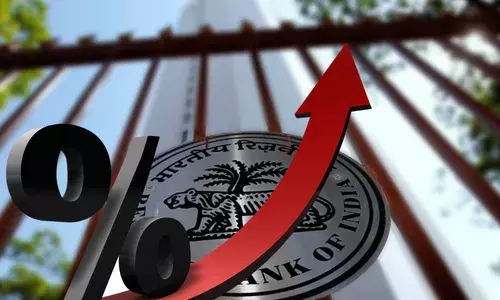Summary
The government has mandated the central bank to ensure that the retail inflation based on the Consumer Price Index (CPI) stays at 4 per cent, with a margin of 2 per cent on either side.
Mumbai: The RBI's high-powered rate setting panel ( Monetary Policy Committee) on Wednesday began its 3-day brainstorming session on the next set of bi-monthly monetary policy amid expectation of continued pause on the short-term key lending rate as GDP growth is gaining momentum, and inflation manageable, reports PTI
RBI left the benchmark policy rate (repo) unchanged in its past four bi-monthly monetary policies. It had last increased the repo rate in February to 6.5 per cent, thus ending the interest rate hike cycle which began in May 2022 in the aftermath of Russia-Ukraine war and subsequent disruptions in the global supply chain resulting in high inflation in the country.
RBI Governor Shaktikanta Das would unveil the decision of the six-member MPC (Monetary Policy Committee) on December 8.
On expectations from the MPC, Aditi Nayar, Chief Economist at ICRA said with the GDP data for the second quarter of 2023-24 appreciably higher than the MPC's last forecast, and continuing concerns on various aspects of food inflation, "we expect the MPC to pause in its December 2023 review, amidst a fairly hawkish tone of the policy document".
According to Deutsche Bank Research, RBI will likely increase 2023-24 GDP forecast to 6.8 per cent year-on-year, from 6.5 per cent earlier, while holding the CPI forecast unchanged at 5.4 per cent.
"RBI will likely keep repo rate and stance unchanged, persist with tight liquidity and ensure that short-term rates remain around 6.85-6.90 per cent, resulting in an 'effective rate hike'," it said.
India retained the tag of the world's fastest-growing major economy, with its GDP expanding by a faster-than-expected rate of 7.6 per cent in the September quarter on booster shots from government spending and manufacturing.
Director of Medical Technology Association of India (MTaI) Sanjay Bhutani, said the central bank's recent MPC meetings have kept the policy rate unchanged, aligning with market expectations.
"We anticipate a similar outcome for this upcoming meeting. However, with inflation on a downward trend, an easing of interest rates could be on the cards, potentially occurring as early as February-March 2024," he said, and added this would be a positive development for all sectors, particularly capital and research-intensive industries like the medical technology sector.
The government has mandated the central bank to ensure that the retail inflation based on the Consumer Price Index (CPI) stays at 4 per cent, with a margin of 2 per cent on either side.
Retail inflation eased to a four-month low of 4.87 per cent in October, mainly due to cooling prices of food items. The Reserve Bank's MPC, in its October meeting, projected CPI inflation at 5.4 per cent for 2023-24, a moderation from 6.7 per cent in 2022-23.
H S Bhatia, Managing Director of Kelwon Electronics and Appliances, manufacturing partner for Daewoo India, said RBI's monetary policy decisions will have a significant impact on the consumer durable industry.
The industry is hoping that RBI will keep interest rates stable or even reduce them slightly in the upcoming review so that consumers get enough purchasing power," he said.
Parijat Agrawal, Head - Fixed Income, Union Asset Management Company said the US 10-year bond has corrected meaningfully from the peak in line with the incoming data and the central bank narrative, and concerns around oil prices too have reduced.
"Although MPC will emphasise on bringing inflation to the 4 per cent target, we expect MPC to remain on pause on rates and stance," Agrawal said.
The MPC comprises three external members and three officials of RBI. The external members on the panel are Shashanka Bhide, Ashima Goyal, and Jayanth R Varma. Besides Governor Das, the other RBI officials in MPC are Rajiv Ranjan (Executive Director) and Michael Debabrata Patra (Deputy Governor).
 Learn & Earn
Learn & Earn  Home
Home
